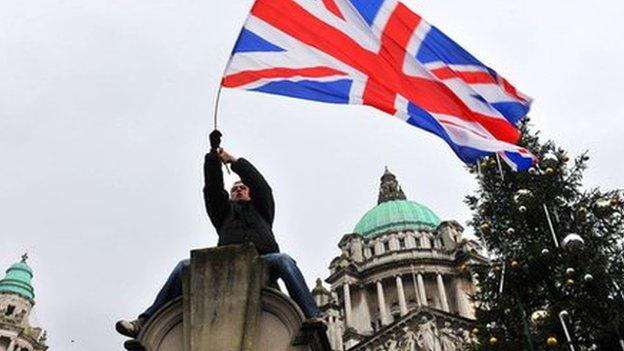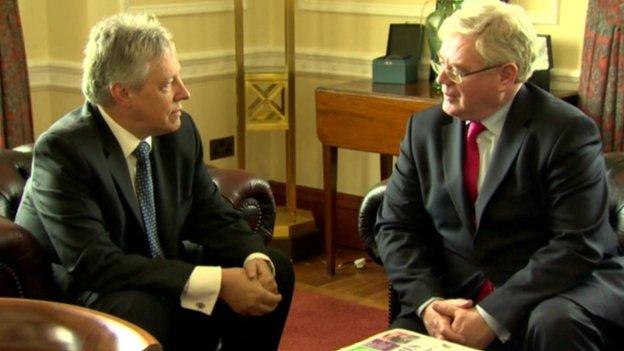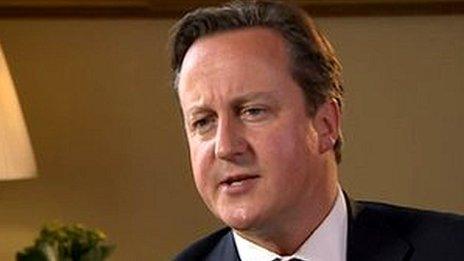Theresa Villiers to convene inter-party talks
- Published
Secretary of State Theresa Villiers is to convene inter-party talks to try and solve outstanding political issues, including flags, parades and the past.
The Northern Ireland secretary of state is to convene inter-party talks to try to solve outstanding political issues, including flags, parades and the past.
Theresa Villiers made the announcement at the Conservative Party conference in Birmingham.
She told party activists "disputes over flags, parades and the past are consuming ever increasing amounts of time and resources".
She said both the British and Irish governments would be involved.
Ms Villiers also urged unionists to re-engage in the talks process.
She told delegates that "we urgently need unionists back round the table to tackle the legacy issues".
"I fully appreciate how very difficult these issues are, the roots of some of them date back centuries, but there are huge benefits for Northern Ireland if a way can be found to make progress on them," she said.
In the last Conservative conference before the general election, the secretary of state said it was now time for "a new round of cross-party talks to be convened".
She said that all the parties need to work together to "lift the blockages which are now preventing the devolved executive from delivering the efficient and effective government that the people of Northern Ireland want and deserve".
She added that there is "now an opportunity for the UK government to play a more direct role as a participant".
'No more to give'
Ms Villiers used her annual address to the party faithful to criticise the stance of Sinn Féin and the SDLP over their welfare reform position.
She said on the reform of the welfare system that the government has "no more to give".
The secretary of state urged the nationalist parties to accept the changes at Stormont and said their refusal to implement change is "holding us back".
She warned that "welfare is devolved, so Northern Ireland can maintain parity with the rest of the UK or go it alone".
She cautioned that a separate welfare system in Northern Ireland would have "massive financial costs" and would be a "more expensive system".
'Important'
DUP leader Peter Robinson said his party would take part in the talks.
"It would be very silly if we weren't there, because I was the one who encouraged her and, indeed, encouraged the other parties to join in those talks," he said.
"I think it's important, every party will have issues they want to raise and, in the first instance, undoubtedly those will be of a bilateral nature and hopefully when there's a measure of agreement we can have more intensive discussions."
Sinn Féin's Gerry Adams welcomed the talks announcement.
"For our part, Sinn Féin is ready for talks. We will enter them to resolve issues and will, as always, abide by any agreements made," he said.
"Others must commit to do the same and the talks should be convened as a matter of urgency by the two governments and supported by the American administration."
Ms Villiers' decision to convene talks comes after she was criticised by the Labour Party and the SDLP who both think the government has been detached from the political process in recent months.
Ivan Lewis, shadow secretary of state, said: "We welcome the UK and Irish government's decision to respond positively to the proposal I made at last week's Labour party conference.
'Compromises'
"It has been clear for some considerable time that the engagement of the two governments is essential if political stalemate in Northern Ireland is to end.
"I hope that Northern Ireland's political leaders will now rise to the challenge and make the necessary compromises which are essential if progress is to be made."
Irish Foreign Minister Charlie Flanagan said he was "strongly of the view that all-party talks involving the two governments are required to overcome the current political impasse with the Northern Ireland Executive".
He added: "I will travel to Washington DC where I will meet with US Vice President Joe Biden, Secretary of State John Kerry, and a number of influential US political figures.
"I will be reiterating my message on the need for continued strong US support for the peace process in Northern Ireland."
However, TUV leader Jim Allister said Ms Villiers was "only interested in a sticking plaster approach".
He said: "Stormont is broken because its structures are anti-democratic and fatally flawed.
"I see nothing in Ms Villiers' speech which points towards recognition of the need for root and branch change."
Precise details of how a new talks process would work will become clear after the secretary of state has discussions with the five main parties and the Irish government.
Last year, US diplomat Dr Richard Haass and his associate, Dr Meghan O'Sullivan, failed in their attempts to reach all-party agreement about the issues of past, parades, flags and emblems.
- Published12 December 2014

- Published9 June 2014

- Published27 September 2013
